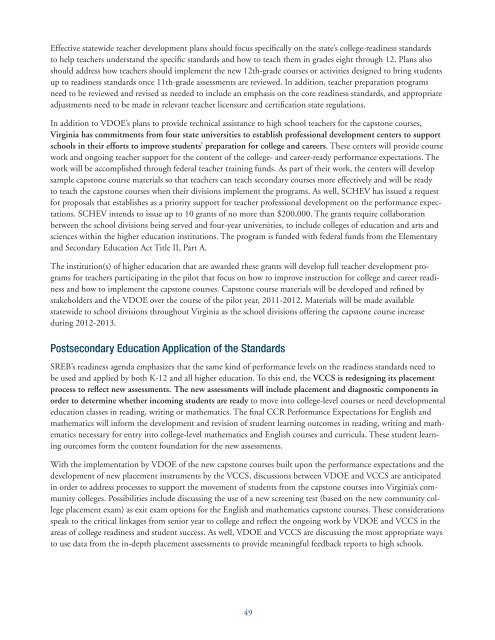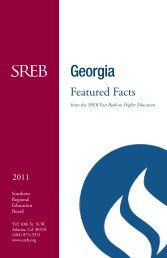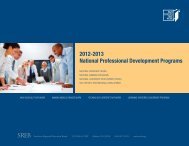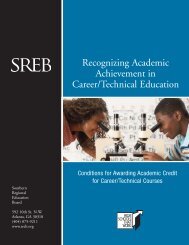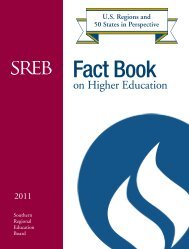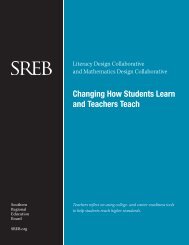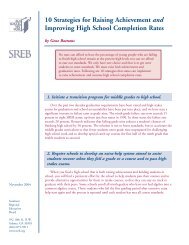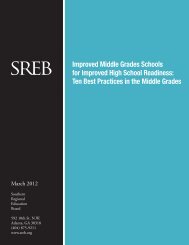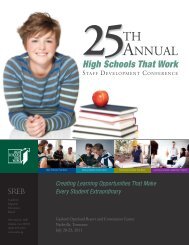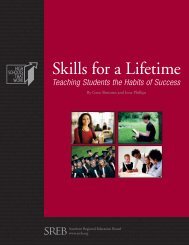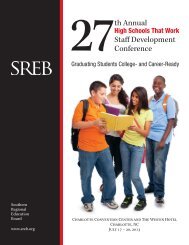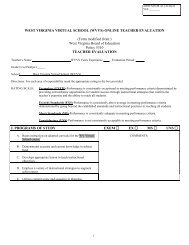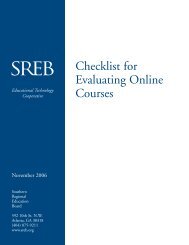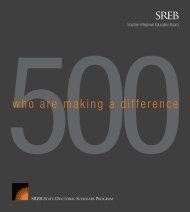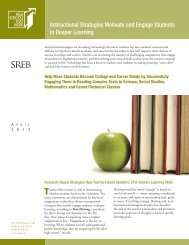Final Progress Reports - Southern Regional Education Board
Final Progress Reports - Southern Regional Education Board
Final Progress Reports - Southern Regional Education Board
You also want an ePaper? Increase the reach of your titles
YUMPU automatically turns print PDFs into web optimized ePapers that Google loves.
Effective statewide teacher development plans should focus specifically on the state’s college-readiness standards<br />
to help teachers understand the specific standards and how to teach them in grades eight through 12. Plans also<br />
should address how teachers should implement the new 12th-grade courses or activities designed to bring students<br />
up to readiness standards once 11th-grade assessments are reviewed. In addition, teacher preparation programs<br />
need to be reviewed and revised as needed to include an emphasis on the core readiness standards, and appropriate<br />
adjustments need to be made in relevant teacher licensure and certification state regulations.<br />
In addition to VDOE’s plans to provide technical assistance to high school teachers for the capstone courses,<br />
Virginia has commitments from four state universities to establish professional development centers to support<br />
schools in their efforts to improve students’ preparation for college and careers. These centers will provide course<br />
work and ongoing teacher support for the content of the college- and career-ready performance expectations. The<br />
work will be accomplished through federal teacher training funds. As part of their work, the centers will develop<br />
sample capstone course materials so that teachers can teach secondary courses more effectively and will be ready<br />
to teach the capstone courses when their divisions implement the programs. As well, SCHEV has issued a request<br />
for proposals that establishes as a priority support for teacher professional development on the performance expectations.<br />
SCHEV intends to issue up to 10 grants of no more than $200,000. The grants require collaboration<br />
between the school divisions being served and four-year universities, to include colleges of education and arts and<br />
sciences within the higher education institutions. The program is funded with federal funds from the Elementary<br />
and Secondary <strong>Education</strong> Act Title II, Part A.<br />
The institution(s) of higher education that are awarded these grants will develop full teacher development programs<br />
for teachers participating in the pilot that focus on how to improve instruction for college and career readiness<br />
and how to implement the capstone courses. Capstone course materials will be developed and refined by<br />
stakeholders and the VDOE over the course of the pilot year, 2011-2012. Materials will be made available<br />
statewide to school divisions throughout Virginia as the school divisions offering the capstone course increase<br />
during 2012-2013.<br />
Postsecondary <strong>Education</strong> Application of the Standards<br />
SREB’s readiness agenda emphasizes that the same kind of performance levels on the readiness standards need to<br />
be used and applied by both K-12 and all higher education. To this end, the VCCS is redesigning its placement<br />
process to reflect new assessments. The new assessments will include placement and diagnostic components in<br />
order to determine whether incoming students are ready to move into college-level courses or need developmental<br />
education classes in reading, writing or mathematics. The final CCR Performance Expectations for English and<br />
mathematics will inform the development and revision of student learning outcomes in reading, writing and mathematics<br />
necessary for entry into college-level mathematics and English courses and curricula. These student learning<br />
outcomes form the content foundation for the new assessments.<br />
With the implementation by VDOE of the new capstone courses built upon the performance expectations and the<br />
development of new placement instruments by the VCCS, discussions between VDOE and VCCS are anticipated<br />
in order to address processes to support the movement of students from the capstone courses into Virginia’s community<br />
colleges. Possibilities include discussing the use of a new screening test (based on the new community college<br />
placement exam) as exit exam options for the English and mathematics capstone courses. These considerations<br />
speak to the critical linkages from senior year to college and reflect the ongoing work by VDOE and VCCS in the<br />
areas of college readiness and student success. As well, VDOE and VCCS are discussing the most appropriate ways<br />
to use data from the in-depth placement assessments to provide meaningful feedback reports to high schools.<br />
49


